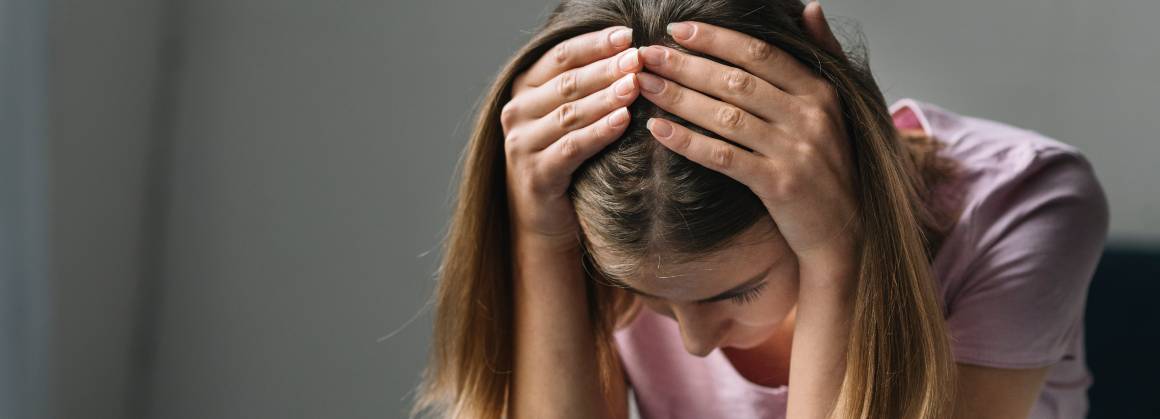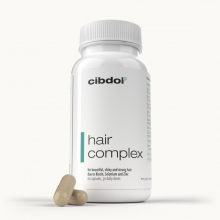Can stress and anxiety cause hair loss?
Published:
Hair loss is a common concern for both men and women. While genetics play a major role, other factors like stress and anxiety can also trigger hair loss. In this comprehensive guide, we’ll explore the links between anxiety, stress and hair loss, the types of hair loss caused by anxiety, and what you can do to stop anxiety from affecting your hair.
Contents:
- How Do Anxiety and Stress Affect Hair Growth?
- What’s The Link Between Anxiety Disorders And Hair Loss?
- What Are The Types of Hair Loss Caused By Anxiety?
- Questions and Answers About Anxiety Causing Hair Loss:
- What Can You Do To Treat Hair Loss From Anxiety?
- In Summary: Key Takeaways on Anxiety Causing Hair Loss
- Can stress and anxiety cause hair loss?
- How does anxiety and stress affect your hair?
- Is hair loss due to stress reversible?
- Can anxiety cause your hair to turn gray?
- What are the causes of anxiety-related hair loss?
- Can anxiety and stress cause the hair to fall out in patches?
- How does stress cause hair loss?
- What can I do to reduce anxiety-related hair loss?
- Can stress activate hair follicle stem cells?
- Is there a connection between anxiety and gray hair?
Hair loss can be worrying and stressful in itself. But does stressing over hair loss actually make the problem even worse? Can anxiety and chronic stress lead to excessive hair shedding or thinning hair? Understanding the link between anxiety and hair loss is the first step in breaking this frustrating cycle.

How Do Anxiety and Stress Affect Hair Growth?
Stress affects the entire body, including your largest organ - your skin and scalp. When you’re under pressure, your body produces more of the stress hormone cortisol. While this helps you deal with threats in the short-term, chronic stress and elevated cortisol levels can take a toll.
Cortisol may interfere with the normal hair regrowth process. Each hair follicle on your head follows a specific growth cycle. Hair grows during the anagen (growth) phase, which lasts 2-6 years. It then transitions to the catagen (transitional) phase for about 2-3 weeks before entering the telogen or resting phase, which lasts around 2-3 months. Typically 10-15% of your hair is in the resting phase at any time before new hair pushes it out.
Chronic stress can prematurely push more resting hair into the shedding or telogen phase. This can mean excess hair shedding and apparent thinning. The good news is that this type of temporary hair loss, known as telogen effluvium, will often reverse once stress hormone levels return to normal. Getting anxious over hair loss can become a vicious cycle though – you stress over the hair loss, which then causes more hair loss.
Chronic anxiety and elevated cortisol can also interfere with the normal activation of hair follicle stem cells that regenerate new hair. Over time, this may lead to impaired hair follicle health, slower hair regrowth, and thinning hair.
What’s The Link Between Anxiety Disorders And Hair Loss?
For many people, excessive hair shedding from stress or anxiety is temporary. But research shows that chronic, long-term anxiety can have lasting effects on your hair follicles and growth cycles.
Those with generalized anxiety disorder often have persistently high cortisol levels. A study by the National Institutes of Health found that the stress hormone cortisol can inhibit hair follicle regeneration. This affects the underlying dermal papilla cells that regenerate hair follicles throughout the growth phase.
Other studies show that chronic anxiety may lead to oxidative stress, inflammation and problems with cell signaling – all factors that can impair follicle regeneration.
The end result is that anxiety makes it harder for hair to re-enter the growth phase. Existing hair stays in the resting phase longer before shedding. With fewer new hairs growing in, this creates the appearance of thinner hair or balding patches.
What Are The Types of Hair Loss Caused By Anxiety?
There are a few different ways that anxiety can lead to hair loss or a thinning scalp. Being aware of the type of hair loss you’re experiencing can guide the right treatment approach.
Telogen Effluvium
As mentioned, this is a temporary but excessive shedding caused by a shift of hair to the resting phase. With generalized anxiety or chronic stress, more hairs across the scalp enter the telogen or shedding phase at once. You may notice more hair falling out while brushing or in the shower. It often starts 2-4 months after a stressful period.
The good news is that this type of hair loss often corrects itself once anxiety is under control and stress hormones return to normal. The hair follicles are not permanently damaged, just temporarily pushed into dormancy. Regrowth of new healthy hair is possible.
Alopecia Areata
This autoimmune disorder causes patchy hair loss, often triggered by severe stress. In alopecia areata, the body’s immune system mistakenly attacks the hair follicles as if they are a threat. This can make hair fall out in clumps or circular bald patches. It’s unclear why stress induces this abnormal immune response against hair follicles in some anxiety sufferers.
Getting anxiety and stress under control is key to manage this condition. But medications or steroid injections may also suppress the immune attack on hair follicles to stimulate regrowth.
Trichotillomania (Hair Pulling)
This type of hair loss is directly caused by anxiety and stress, but from an impulse control disorder. Those with trichotillomania feel strong urges to pull out head hair when stressed or anxious. This leads to patches of lost hair which can be embarrassing and upsetting.
Cognitive behavioral therapy can teach people with trichotillomania to control their hair pulling urges and compulsions. Reducing anxiety levels is also key to recovery.
Premature Hair Graying
While not full hair loss, anxiety has also been linked to premature gray hair in younger or middle-aged adults. One large study found a connection between chronic stress and premature graying. Stress may trigger oxidative damage and a depletion of the melanocyte stem cells that produce hair pigmentation.
Managing anxiety and lifestyle changes to reduce oxidative stress may help slow or prevent stress-related graying. A healthy diet with antioxidant foods can support melanocyte stem cells.
10 Questions and Answers About Anxiety Causing Hair Loss:
-
How does anxiety cause hair loss?
Anxiety and chronic stress can push more hair follicles into the telogen or resting phase at once. Anxiety may also inhibit new hair from entering the growth phase. This disrupts the normal hair regrowth cycle.
-
Can anxiety and stress cause permanent hair loss?
If anxiety is temporary, hair loss may be reversible. But long-term generalized anxiety seems to impair hair follicle regeneration, which may cause persistent thinning. Properly treating anxiety can help restore healthy hair regrowth.
-
Do anxiety medications cause hair loss as a side effect?
Certain anti-anxiety meds like Klonopin, Xanax, and Valium can trigger temporary hair shedding when first started. But controlling anxiety with the proper medication is important for hair health.
-
Can reducing stress reverse anxiety-related hair loss?
Yes, lowering stress and anxiety levels allows hair follicles to return to their normal cycles. Practices like meditation, exercise, therapy and stress management can aid hair regrowth.
-
Does anxiety affect hair health even if no visible thinning occurs?
Chronic anxiety seems to impact follicle cells at the microscopic level. So even without shedding, anxiety may interfere with optimal hair growth cycles and follicle regeneration.
-
Can anxiety cause hair loss in women?
Yes, anxiety and stress can trigger hair loss in both women and men. Women may experience diffuse thinning across the scalp rather than a receding hairline.
-
Can anxiety cause clumps or patches of hair to fall out?
Yes, anxiety can cause temporary clumps of hair loss with telogen effluvium. More permanent patchy loss is seen with the autoimmune disorder alopecia areata, often triggered by severe stress.
-
Can anxiety cause hair loss after COVID-19?
Many people report increased hair shedding months after a COVID-19 infection, due to the body’s stress response. Managing anxiety post-COVID may aid normal regrowth.
-
Can hair loss from anxiety grow back?
Yes, when anxiety is treated and stress hormones return to normal levels, new hair can grow back. Practicing hair regrowth methods can boost circulation and growth.
-
Will hair loss stop if I get treated for anxiety?
Controlling chronic anxiety and reducing stress through therapy, meditation, medication, or other methods can allow new hair to properly re-enter the growth phase. This helps restore healthy hair.
What Can You Do To Treat Hair Loss From Anxiety?
If anxiety or stress is causing noticeable hair thinning or loss, getting treatment should be your priority. Hair regrowth has the best chance of success when anxiety is properly managed through:
- Therapy and counseling – CBT and talk therapy give you tools to control stress and anxiety. They can get to the root of anxiety triggers.
- Medication – Anti-anxiety meds, antidepressants, beta blockers can keep anxiety symptoms at bay. They may allow hair follicles to return to normal cycles.
- Meditation and mindfulness – Deep breathing, guided meditation, yoga, and mindfulness practices help lower daily anxiety levels. This reduces cortisol and stress hormones.
- Exercise and fitness – Active stress relief through aerobic exercise and strength training helps balance body and mind. A healthy body supports healthy hair.
- Improved sleep hygiene – Getting enough quality sleep allows the body to properly regenerate cells and repair damage from anxiety. Poor sleep prolongs stress.
- Massage and acupressure – Therapeutic massage increases circulation across the scalp. Acupressure targets pressure points that relieve tension and anxiety symptoms. This nourishes follicle cells.
In addition to anxiety treatment, using proven hair growth methods can provide additional support:
- Scalp massages to increase blood flow
- Hair growth supplements like biotin, zinc, vitamin D
- Hair masks to nourish follicles
- Low level laser therapy devices to stimulate follicles
- Platelet rich plasma (PRP) therapy to encourage regrowth
- Topical minoxidil to prolong growth phase
In Summary: Key Takeaways on Anxiety Causing Hair Loss
- Chronic stress produces hormones like cortisol that can interfere with normal hair growth cycles.
- Hair shifts prematurely into the resting phase before excess shedding occurs in telogen effluvium.
- Studies show anxiety may inhibit hair follicle stem cell regeneration over time.
- Generalized anxiety is linked to lasting thinning due to impaired follicle regrowth.
- Alopecia areata causes patchy hair loss when anxiety triggers an abnormal autoimmune response.
- Trichotillomania is an impulse disorder causing hair pulling and loss only when anxious.
- Premature graying has also been connected to chronic anxiety.
- Controlling anxiety through therapy, medication, meditation, exercise allows hair to re-enter the normal growth phase.
- Using proven regrowth methods can aid the recovery process.
In conclusion, there are clear links between anxiety disorders and changes to the hair growth cycle that can cause temporary or permanent loss. Pay attention to the symptoms and types of hair loss you experience to determine the right treatment plan. Getting anxiety under control is critical to keeping your hair healthy and reversing damage that may have already occurred. Be patient during the process, as hair regrowth takes time.
Can stress and anxiety cause hair loss?
Yes, stress and anxiety can cause hair loss. It is a common form of hair loss and is referred to as "anxiety hair loss" or "stress-induced hair loss".
How does anxiety and stress affect your hair?
When you experience high levels of stress and anxiety, it can disrupt the normal hair growth cycle. This can lead to excessive shedding or hair loss.
Is hair loss due to stress reversible?
In many cases, hair loss caused by stress is reversible. Once the underlying stress or anxiety is addressed and managed, the hair may start to grow back.
Can anxiety cause your hair to turn gray?
While stress and anxiety are not direct causes of hair turning gray, they can accelerate the graying process in individuals who are predisposed to premature graying.
What are the causes of anxiety-related hair loss?
Anxiety-related hair loss can be caused by several factors. It can be a result of a disrupted hair growth cycle, changes in hormone levels due to stress, or the impact of stress on the immune system, leading to hair follicle damage.
Can anxiety and stress cause the hair to fall out in patches?
Yes, anxiety and stress can cause the hair to fall out in patches. This condition is known as "alopecia areata" and is characterized by the immune system attacking the hair follicles, resulting in bald patches.
How does stress cause hair loss?
Stress causes hair loss by triggering an autoimmune response where the immune system mistakenly attacks the hair follicles. This leads to a disruption in the hair growth cycle and can result in hair shedding or thinning.
What can I do to reduce anxiety-related hair loss?
Managing your stress and anxiety levels is key to reducing anxiety-related hair loss. Practices such as regular exercise, relaxation techniques, and seeking support from a mental health professional can be helpful.
Can stress activate hair follicle stem cells?
No, stress does not activate hair follicle stem cells. In fact, chronic stress can inhibit hair growth and lead to hair loss.
Is there a connection between anxiety and gray hair?
While there is no direct connection between anxiety and gray hair, excessive stress and anxiety can contribute to premature graying in individuals who are genetically predisposed.












